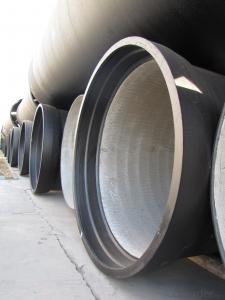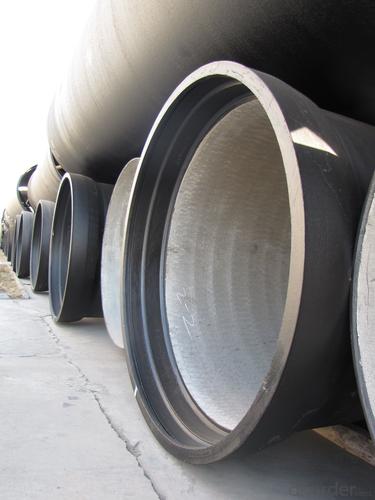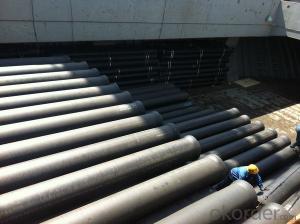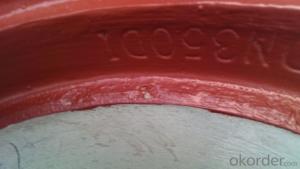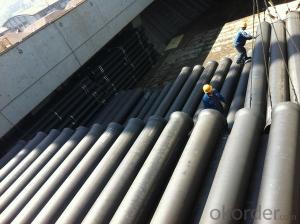T Type Ductile Iron Pipe DN1800 socket spigot pipe
- Loading Port:
- Tianjin
- Payment Terms:
- TT OR LC
- Min Order Qty:
- 10 m
- Supply Capability:
- 30000 m/month
OKorder Service Pledge
OKorder Financial Service
You Might Also Like
1) The standard of pipe: ISO2531:1998, EN545:2006,K9 K8
2) Effective length: 6m/5.7m
3) Inner cement line: Portland cement lineas per ISO4179
4) Zinc coating: at least 130g/m2 as per ISO8179
5) Bitumen painting: at least 70μm as per ISO8179
6)With 102% quantity of NBR, SBR, or EPDM ring asper ISO4633
7) DN80-DN1200
8) Highstrength, lighter than grey iron, good corrosion resistance, no furring, smallflow resistance, easy fixing, long life tome about 100 yeas
9)Checked by automatic inspection equipment
10) Composition:
Chemical composition | |||
Chemical composition | Ductile Cast Iron Pipe (%) | Grey iron pipe (%) | Steel pipe (%) |
C | 3.5-4.0 | 3.2-3.8 | 0.1-0.2 |
Si | 1.9-2.6 | 1.4-2.2 | 0.15-0.4 |
Mn | 0.15-0.45 | 0.4-0.6 | 0.3-0.6 |
P | ≤0.06 | ≤0.3 | 0.02-0.03 |
S | ≤0.02 | ≤0.1 | 0.02-0.03 |
Mg | 0.03-0.06 |
|
|
11) Feature:
Mechanical properties | |||
| Ductile Cast Iron Pipe | Grey Iron Pipe | Steel Pipe |
Tensile Strength(Mpa) | ≥420 | 150-260 | ≥400 |
Yield Strength(Mpa) | ≥300 | No Confirmation | No Confirmation |
Bending Strength(Mpa) | ≥590 | 200-360 | ≥400 |
Elongation (%) | ≥10 | Neglected | ≥18 |
Brinell Hardness(HBS) | ≤230 | ≤230 | About 140 |
12) T type mechanical joint
13) Packing: in bulk or container
PACKING: 1) Pipesare bundled together with the steel belt.
2) Wooden pieces are put between the pipes.
- Q: Can ductile iron pipes be used for underwater installations?
- Indeed, underwater installations can make use of ductile iron pipes. Ductile iron, renowned for its robustness and longevity, exhibits a remarkable resistance to corrosion, rendering it well-suited for submerged applications. Moreover, the exceptional joint integrity of ductile iron pipes guarantees their impermeability, even when subjected to substantial hydrostatic pressure. To bolster their resistance to corrosion and prolong their lifespan in underwater settings, these pipes are often coated with protective linings and coatings. All in all, ductile iron pipes are a dependable option for underwater installations due to their formidable strength, durability, and corrosion resistance attributes.
- Q: Can ductile iron pipe be used for industrial wastewater applications?
- Yes, ductile iron pipe can be used for industrial wastewater applications. It has excellent strength, durability, and corrosion resistance, making it suitable for handling various types of wastewater in industrial settings. Additionally, ductile iron pipe is known for its ability to withstand high-pressure and high-temperature conditions, making it a reliable choice for industrial wastewater applications.
- Q: Can ductile iron pipe be used for mining applications?
- Yes, ductile iron pipe can certainly be used for mining applications. Ductile iron is a type of cast iron that exhibits significant tensile strength, flexibility, and durability, making it suitable for demanding and rugged environments like mining. Its high strength-to-weight ratio allows for easy handling and installation, making it a cost-effective choice for mining operations. Ductile iron pipes are resistant to corrosion and have excellent mechanical properties, including high impact and fatigue resistance. These properties make them ideal for transporting various materials commonly found in mining, such as water, slurries, and abrasive ores. Additionally, ductile iron pipes have a long lifespan, ensuring reliable performance and minimal maintenance requirements in mining operations. Furthermore, ductile iron pipes can withstand high pressures and maintain their integrity under extreme conditions, making them suitable for underground mining applications. They can handle the demanding requirements of deep mining operations, including the transport of water for cooling or dust suppression, as well as the drainage of wastewater or mine dewatering. Overall, ductile iron pipes provide the necessary strength, resilience, and corrosion resistance required for mining applications. Their versatility, durability, and ease of installation make them a valuable choice for mining operations, ensuring efficient and reliable material transport while minimizing downtime and maintenance costs.
- Q: Can ductile iron pipes be used for agricultural applications?
- Yes, ductile iron pipes can be used for agricultural applications. Ductile iron is a strong and durable material that is resistant to corrosion, making it suitable for various agricultural purposes. These pipes can be used for irrigation systems, drainage systems, water supply systems, and other agricultural infrastructure projects. Ductile iron pipes have a high tensile strength and can withstand the external pressures and stress that may occur in agricultural environments. Additionally, they have a long lifespan, reducing the need for frequent replacements, and are capable of handling high water flow rates. Therefore, ductile iron pipes are a reliable choice for agricultural applications.
- Q: What is the lifespan of ductile iron pipe?
- The lifespan of ductile iron pipe can vary depending on various factors such as the quality of the pipe, the environment in which it is installed, and the maintenance practices followed. However, on average, ductile iron pipe has a lifespan of around 80 to 100 years. This long lifespan can be attributed to the inherent durability and strength of ductile iron, which allows it to withstand high pressure, external loads, and environmental conditions. Additionally, ductile iron pipe is often coated with protective linings such as cement mortar or epoxy to further enhance its resistance to corrosion and extend its lifespan. Regular inspections and maintenance can also contribute to prolonging the lifespan of ductile iron pipe by identifying and addressing any potential issues in a timely manner. Ultimately, with proper installation, maintenance, and care, ductile iron pipe can provide reliable and long-lasting service for several decades.
- Q: What are the different lining thickness options for ductile iron pipe?
- The specific application and project requirements typically dictate the various options for lining thickness in ductile iron pipes. Cement mortar lining, polyurethane lining, and polyethylene lining are among the most commonly used options. Cement mortar lining, which is widely employed in ductile iron pipes, involves the application of a layer of cement mortar on the inner surface of the pipe. This lining provides corrosion protection and enhances the hydraulic performance of the pipe. The thickness of cement mortar lining can vary from 3mm to 6mm. Polyurethane lining, another popular choice, is particularly suitable for applications requiring resistance to abrasion and chemical attack. It is usually applied using a spray or casting method, and the thickness can vary depending on project specifications. Typically, polyurethane linings range from 1mm to 4mm in thickness. Polyethylene lining, a relatively newer technology, is commonly used in applications where chemical corrosion resistance is crucial. The lining is applied using a rotational lining process, wherein a layer of molten polyethylene is evenly distributed on the internal surface of the pipe. The thickness of polyethylene lining can range from 2mm to 8mm, depending on project requirements. It is worth noting that the lining thickness can be tailored to meet specific project needs, including the corrosiveness of the transported fluid, operating conditions, and desired service life of the pipe. Consulting with a qualified engineer or pipe manufacturer is advisable to determine the most suitable lining thickness for a given application.
- Q: Can ductile iron pipes be used for railway crossings?
- Yes, ductile iron pipes can be used for railway crossings. Ductile iron is a strong and durable material that can withstand heavy loads and high traffic volumes, making it suitable for railway crossings. Additionally, it has excellent corrosion resistance properties, which is important for withstanding the harsh environmental conditions associated with railway crossings.
- Q: What is the expected roughness coefficient of ductile iron pipes?
- The roughness coefficient of ductile iron pipes can differ based on different factors like pipe diameter, age, and condition, resulting in variations. However, typically, the roughness coefficient for ductile iron pipes falls within the range of 0.01-0.015 mm. This value signifies the average roughness of the pipe's internal surface and plays a crucial role in hydraulic calculations for establishing the flow characteristics and pressure losses within the pipe network. It is worth mentioning that these values are approximate and subject to change depending on specific pipe conditions and applications.
- Q: How do ductile iron pipes perform in high-traffic areas?
- Ductile iron pipes perform well in high-traffic areas due to their durability and strength. They have the ability to withstand heavy loads and traffic loads without experiencing deformation or damage. Additionally, their corrosion resistance properties make them suitable for prolonged exposure to moisture and harsh environmental conditions. Overall, ductile iron pipes are a reliable choice for high-traffic areas.
- Q: Can ductile iron pipe be recycled?
- Yes, ductile iron pipe can be recycled. It is a highly recyclable material that can be melted down and reused in the production of new ductile iron products. Recycling ductile iron pipe helps reduce waste and conserves natural resources.
Send your message to us
T Type Ductile Iron Pipe DN1800 socket spigot pipe
- Loading Port:
- Tianjin
- Payment Terms:
- TT OR LC
- Min Order Qty:
- 10 m
- Supply Capability:
- 30000 m/month
OKorder Service Pledge
OKorder Financial Service
Similar products
Hot products
Hot Searches
Related keywords
